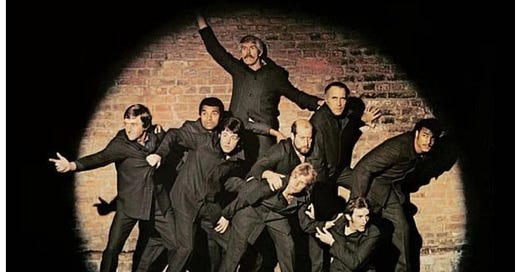'Cause I got you
Paul McCartney and Wings - Nineteen Hundred and Eighty-Five (Band on The Run - 1973)
Hello, I am back from California, and unlike previous breaks, I didn’t cue up some posts in my absence, but I’ve got a few irons in the fire for the rest of the month already. Those with long memories might remember me mentioning being in Manchester and accidentally listening to The Beach Boys…
Weeeeeeeeeeeeeeeeee
In 2008 I happened to be in Manchester with friends with the 2007 remaster CD (remember them?) of Unknown Pleasures, Joy Division's 1979 debut album - I thought it would be highly appropriate to have it on while we drove through the dark, in the drizzle, on the M60 over and under the concrete flyovers. My friends had other ideas, and somehow, we ended u…
So, the question posed at the end of that article has now been answered; a week ago, I was standing in the Pacific Ocean, listening to Joy Division.
Moving on, we come to an album that turned 50 last year and has just seen another release earlier this month with the so-called Underdubbed versions escaping the vault.
Following the dissolution of The Beatles in the first few months of 1970, Paul McCartney faced the daunting task of forging a separate path away from the monumental legacy of the Fab Four. That question was one that critics at the time felt McCartney stumbled through on records like McCartney and Ram. (they are wrong), It was not until the formation of Wings and their third record that there was a genuine acceptance that he had produced something worth comparing with his work in the band.1 His quest for a new musical identity culminated in the creation of Band on the Run, a pivotal album that rejuvenated McCartney's critical standing and established him as a force in his own right in the post-Beatles era.
At the time, he had only been able to fall back on the commercial success of Red Rose Speedway and ‘My Love’, but these did little for his stock with critics, and he was still seen as a primary antagonist, responsible for the Beatles’ breakup. Wings acted as a bit more of a lightning conductor, allowing Paul to go out on tour for the first time since the Beatles had in 19662 and allowed him to get back to rock ‘n’ roll basics with both Linda McCartney and Denny Laine on board.
The album’s grand finale is the epic ‘Nineteen Hundred and Eighty-Five’, carried around in Macca’s head for months beforehand as told to Paul ‘Gambo’ Gambaccini in In His Own Write.
With a lot of songs I do, the first line is it. It’s all in the first line, and then you have to go on and write the second line. With ‘Eleanor Rigby’ I had “picks up the rice in the church where the wedding has been.” that was the one big line that started me off on it. With this one, it was “No one ever left alive in nineteen hundred and eighty-five” That’s all I had of that song for months. “No one ever left alive in nineteen hundred and eighty… six?” It wouldn’t have worked!
The Band on the Run recording in Lagos, Nigeria, was fraught with challenges, from inadequate studio facilities to personal safety concerns. McCartney had been attracted to the idea of recording outside of the UK, and looking at a list of EMI’s various recording studios in the world, he zeroed in on Lagos, and no one took him to one side and suggested that maybe that particular studio was ramshackle and under-equipped compared to the others available.
Never mind that the studio was barely functional, the band faced everything from muggings to confrontations with local musicians like Fela Kuti and Ginger Baker, who worried that the ex-Beatle was muscling in on their territory. Despite these challenges, the stripped-down setup forced McCartney to innovate, playing multiple instruments and relying on his bandmates' raw talent and adaptability.
The narrative of ‘Nineteen Hundred and Eighty-Five’ intertwines personal reflection with broader themes of love, time, and the future. The cultural and literary impact of George Orwell's Nineteen Eighty-Four pervades various late 20th-century media, illustrating the depth of its influence on public consciousness. Surprisingly, Paul McCartney, known (even within The Beatles) for his lighter, optimistic music, drew inspiration from Orwell's dystopian narrative for ‘Nineteen Hundred and Eighty-Five’.
McCartney's voracious reading habits and his knack for finding inspiration in diverse sources led him to use the grim setting of a wrecked dystopia to craft a love song, highlighting a relationship meant to be unaffected by the distant future. This song is a testament to McCartney's ability to transform seemingly negative subjects into powerful, uplifting music, underscoring a universal theme of love and its enduring power even in the face of bleak futures.
The song starts with a spirited piano motif and dynamic drumming, coupled with McCartney's expressive vocal delivery, elongating the vowel sounds to add a melodic flourish. The song is characterised by its shifts and breakdowns, transitioning seamlessly between musical segments that aren’t substantial gear changes, more slipping across from one set of tracks to another. This structure echoes the expansive nature of the album's title song and other iconic Beatles compositions like ‘A Day in the Life’ and the Abbey Road medley. Towards its climax, the song revisits its initial themes before transitioning into a sharp guitar solo and a striking brass section, culminating in a reprise of the ‘Band on the Run’.
The song remains a live favourite, setlist.fm have it as McCartney’s 26th most played at live shows and inside the top ten at 8th for non-Beatles material he has played since the early 80s (as a billed solo artist), though never by Wings themselves in the 1970s.
By late 1973, Harrison and Lennon had already released All Things Must Pass, Plastic Ono Band and Imagine.
Or you could count the plans on show in the Get Back film and documentary as the last time going on the road was a plan.






